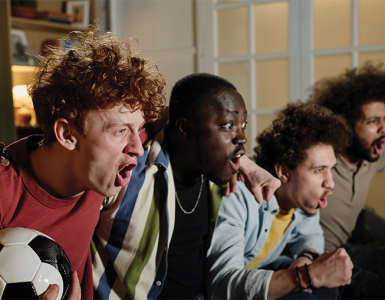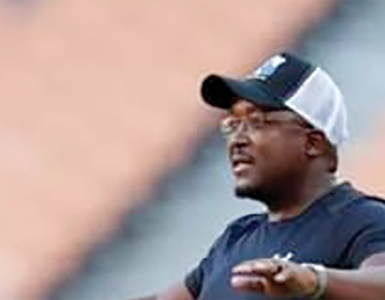LOUDMOUTH: The undisputed women’s middleweight world boxing champion boasts the gift of the gab as well as the gift of the jab
By Sports Reporter
“Dirty water ain’t gonna stop us putting on those Gucci clothes.” Claressa Shields is walking around her hometown of Flint, Michigan. Barking dogs are the soundtrack to a stroll down a street that bears the name of the two-time Olympic gold medallist, and undisputed middleweight world boxing champion.
As she walks, Shields, who some regard as the all time best women’s boxer, is shouted congratulations from all sides of the road.
The 28-year-old is a legend in Flint – a city that needs a hero, advocate and spokesperson more than most. The original home of General Motors, Flint was known as Vehicle City, but as the American motor industry declined, so did the city’s fortunes.
Flint’s population is now half what it was in its 1960s heyday and, as people have left, their tax dollars followed.
The city’s drinking water is now judged to be safe but the city itself is still not, with violent crime running at nearly four times the United States’ national average. Shields keeps walking, and talking, as she drops in the Gucci analogy. It could sound flippant if it wasn’t entirely in keeping with the American’s zealous insistence that her life’s low points are to be channelled.
She believes her harrowing history – explained, named, and put out in the open – can help others. Flint’s water crisis was far from Shields’ first challenge. “At first, I thought my purpose was to be a great boxer. But God wanted me to be a great boxer and to tell my story because it’s going to save so many lives,” she says.
Shields is a natural storyteller. She has the words, the stories, the confidence. In a week filming for BBC Sport’s Born to Brawl series, the tales just fall out of her.
She can trash talk with the best in the world – high praise in boxing, a sport which values running your mouth as much as running the show in the ring. But, unlike a lot of her counterparts in both women’s, and men’s boxing, her narrative has depth. Unspeakably dark depths.
An extended period of sexual abuse began when Shields was just five years old. “I’ve had to work harder than a lot of people to get to where I am,” she says. “I don’t know people who could have been in the same situations and get to where I’ve made it to…
“I’m talking about from the age of five, when I was raped as a young girl to, you know, having to deal with all the anger I had from that. “I had a speech impediment, I couldn’t even talk till I was about six and I stuttered till I was nine.
“Flint has built that no-quit attitude in me. I remember being a kid and this girl chasing me home from school. I ran in the house and my mum was like, ‘What’s going on?’ I’m like, ‘These girls are trying to fight me’. And she was like, ‘Tomorrow when you go to school, you better fight every last one of them!’.
“And so I went to school the next day and I fought a girl at school and then I fought these other girls on the way home from school and everyone just knew don’t mess with Claressa.”
That lesson of fierce self-sufficiency was a constant for Shields. Her father went to prison when she was two and was only released when she was nine. Her mother was an alcoholic and Shields has spoken of her mother’s intermittent unexplained absences, and the constant scratching around for money.
She remembers sacrificing meals so her siblings could eat. “Getting ready for the [London] Olympics I was growing up still in poverty,” she says. “I was 16 years old, living with my mom, me and my siblings, and you know she didn’t have it together.
“So we had a place to stay but we were still having to go some days hungry and I didn’t have a bed to sleep in. “That’s one thing I did when I won the Olympics, first thing I did was bought me a bed.”
But, despite those early experiences, Shields’ overwhelming message is to lean into hope, not despair. “There’s so many kids that are going through similar things I went through,” she says. “And they feel hopeless.
“But God wanted me to use my story to tell them. So they can see. Look I made it, you guys can too. “I wouldn’t wish what I went through on my worst enemy, that’s how bad it was, and I have a few enemies.”
A week in the company of Shields is filled with laughs, lovable bravado and endearing showmanship – by her own admission she has the “gift of the gab as well as the gift of the jab”.
“If there’s a girl who thinks she can beat me, she better wake up and stop dreaming,” she says.
Shields’ professional record consists of 14 straight wins after victory over Maricela Cornejo in June That anger and accuracy took Shields to London 2012 and Rio 2016 gold and two undisputed world championships.
It’s a journey that is inextricably linked with Flint and everything that happened to – and in – that town while Shields was growing up. Flint defines Shields. But her experiences there don’t define her outlook.
“Don’t let it be that because you got raped, now you hate all men, you’re angry your whole life and keep blaming this person for what they did to you,” she says.
“It’s like, that makes them the victor you know, but they’re losers. “I always think about the guy who attacked me when I was younger.
“He couldn’t even break a five-year-old mentally.
WEIGHTY CHALLENGES FOR NYANGANI
DIVISION: Talented boxer has been battling with scales to make the limit
By Pule Mokhine

The going has been pretty tough inside the ring this year for former SA mini-flyweight champion Bangile Nyangani as a result of him struggling to make the required weight for him to compete – to the extent that his camp have now decided to move him up a division and fight as a junior- flyweight from January 2024.
Aaccording to professional boxing rules, a mini-flyweight ¬ – also referred to as strawweight – is the lightest and lowest division at 47.6kg, of all 14 official weight classes in the sport of the fisticuffs. The official limit that constitutes a junior flyweight campaigner is 48.98kg which Nyangani will now compete at.
Now Nyangani will move up a notch to throw punches as junior-flyweight in all his upcoming campaigns.
The 29-year-old from Mthatha in the Eastern Cape boxer has been struggling to tip the scales appropriately for his natural weight (mini fly) since he surrendered his championship belt to Siyakholwa Khuse via a split points decision in his title defense at International Conventional Centre in East London in July.
Since then, things have been pretty tough for him to get fights as a result of his battle to make the required weight limit.
He beat Khuse for the first time in a title defense at Nulling Hall in 2021 and and has since defended the belt five times successfully before surrendering it to the same opponent (Khuse) in his last bout. But weighty problems have since hampered his progress inside the ring.
Now Nyangani’s trainer Allan Toweel feels the time is rife for his charge to move up a gear officially by competing in the heavier class as he is battling to maintain his natural weight.
According to Toweel, his boxer who has been with him since 2016, has been a force to be reckoned with as a mini-flyweight and has now outgrown the mini-flyweights. He added that campaigning in that category will now become history as from next year as the pugilist will be elevated to a junior flyweight division that is regarded as among active very active categories in boxing generally.
“Nyangani has fought only once this year and hasn’t competed ever since then because he couldn’t make the required limit for his natural division as mini-fly as he is often over the limit.
This has frustrated us a lot as his camp. We’ve now decided that it will be in his best interest to fight as a junior flyweight as from next year,” said Toweel.
The wily trainer who comes from a successful boxing family of erstwhile national and world champions, is optimistic that his charge would regain the past glory for which he was renowned when he was still at the helm.
Besides being SA champ, Nyangani also reigned supreme as NBA Pan African title holder as well as being African Boxing Union SADC kingpin. He won both crowns as a mini flyweight.
“With him now moving up a division, we believe there is no doubt he will call the shots in the ring with ease now that he will be extremely comfortable fighting in the junior flyweight category,” added Toweel.
Nyangani has captured an impressive fight record of 13 wins, two draws and one defeat from 16 professional fights. He has had only fight this year and has since been battling with the scales in vain to make the limit.
Just when local boxing has experienced a pretty dull year so far as a result of a lack of most promoters being unable to stage top-class tournaments locally like before, Toweel is also of the view that this scenario has also had a negative effect on Nyangani’s career.
Nyangane has had only one fight this year. Toweel is also concerned about the promoters’ lack of staging fights regularly, saying this is gradually killing boxing in the country.
“I am not trying to speak on behalf of any one, but this has been a tough year for boxing because promoters have simply not been able to come to the party by staging fights like they have before. Hopefully things will change for the best for boxing next year,” concluded Toweel.































